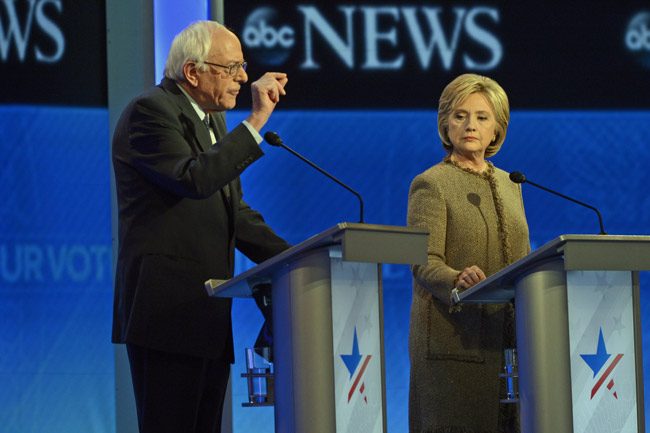
After a raucous debate lasting nearly a year, the Democrats are united on health care. But that unity does not include a call for a single-payer “Medicare for all” health system.
“This campaign is about moving the United States toward universal health care and reducing the number of people who are uninsured or under-insured,” Sen. Bernie Sanders (I-Vt.) said last week in endorsing his rival Hillary Clinton, the presumptive Democratic presidential nominee.
Sanders did win a few health care concessions in the negotiations leading to the endorsement. Clinton vowed to support more funding for community health centers and access to a “public option” government insurance plan, which she has supported in the past.
But on Sanders’ top health priority — his “Medicare for All” plan — there was not a word. At the Democratic Platform Committee meeting over the weekend, an amendment to add a single-payer plan to the document was defeated.
It wasn’t much of a surprise.
Most health policy analysts — including those who are sympathetic to the idea — say moving from the current U.S. public-private hybrid health system to one fully funded by the government in one step is basically impossible. And that’s making a huge assumption that it could get through Congress.
“To try to do it in one fell swoop would be massively disruptive,” said Paul Starr, a professor at Princeton who was a health policy adviser to President Bill Clinton.
The U.S. health care system, said Jeff Goldsmith, a health care consultant and health futurist, is “the size of a country — it’s bigger than France — and it employs 16 million people.”
In moving to a single-payer system, he said, “you’re talking about reallocating $3 trillion, reducing people’s incomes and creating” in effect a single entity that would set prices for all medical services. Single-payer supporters dispute the idea that getting from here to there could not be done.
“We’re so used to such a complicated system in the U.S. that we envisage any change would be incredibly complicated as well,” said Steffie Woolhandler, a physician and one of the founders of the single-payer advocacy organization Physicians for a National Health Program. “But what you’re doing with single-payer is actually simplifying the system.”
For example, said Woolhandler, “the latest data is U.S. hospitals are spending 25 percent of their total budget on billing and administration, and hospitals in single-payer nations like Canada and Scotland are spending 12 percent.”
But while a single-payer system would undoubtedly produce efficiencies, it would also bring huge disruptions. Said Starr, single-payer supporters “haven’t worked through the consequences.”
One of the biggest is exactly how to redistribute literally trillions of dollars. The problem, said Harold Pollack, a professor at the University of Chicago, is that the change will create losers as well as winners.
“Precisely the thing that is a feature for single-payer proponents is a bug for everyone who provides goods and services for the medical economy,” he said, since their profits — and possibly their incomes — could be cut.
And it’s not just the private insurance industry (which would effectively be put out of business) that could feel the impact to the bottom line. Parts of the health care industry that lawmakers want to help, like rural hospitals, could inadvertently get hurt, too. Many rural hospitals get paid so little by Medicare that they only survive on higher private insurance payments. Yet under single-payer, those payments would go away and some could not make it financially. “You would not want to wipe out a third of the hospitals in Minnesota by accident,” Pollack said. “And you could,” if payments to hospitals end up too low.
There are also questions about how feasible it would be to have the federal government run the entire health care system. “It’s hard to be nimble” when a system gets that big, said Ezekiel Emanuel, a former health adviser in the Obama administration now at the University of Pennsylvania. “No organization in the world does anything for 300 million people and does it efficiently.”
The politics of Medicare — which serves roughly 50 million Americans — already make some things difficult or impossible, he said, pointing toa current fight in which doctors and patient advocacy groups blasted a proposal to move to a more cost-effective way to pay for cancer drugs. “You already can’t do certain things in Medicare because of the politicization,” he said. ”When you cover the whole country, it would be a lot of gridlock.”
Pollack agreed, and pointed out it’s not just the health care industry that could revolt. When the Affordable Care Act was rolled out in 2013, he said, “the people who couldn’t keep their old plans — a very tiny number as a percent of Americans” were furious. “We saw how difficult that was and how angry the public was when that promise wasn’t kept. Now imagine the major shift we’d have to do to move to a single payer system.”
There’s also the question of whether it’s simply too late to go back to the health care drawing board.
Single-payer supporter Woolhandler insists it is not. “Other nations have gone to single-payer systems,” she said. “It usually can be done in about a year.”
The last industrialized country that did the switch was Taiwan, in the mid-1990s. Taiwan, however, with its 23 million residents, has a population larger than New York and smaller than Texas, and had no existing private health insurance system at the time.
“What I’ve often said is we could have done this in the 1940s when Harry Truman proposed it,” said Starr, who has written at length on the history of American health politics. “Health care at that point was probably about 4 percent of [gross domestic product] and there existed at that time a relatively small private insurance industry.” Today health care spending in the U.S. is approaching 18 percent of the nation’s GDP and the private health insurance industry accounts for half a trillion dollars per year.
Both Starr and Pollack, however, said it would be possible to make a switch, although it would have to be carried out over a very long period of time.
“You could imagine some kind of long transition, where you gradually expanded Medicare,” said Starr, “for example moving it down to age 55” and then in later years continue to lower the age threshold.
But even if the U.S. did manage to execute a single-payer system, said Pollack, it would likely prove problematic, particularly in how it would be financed.
“The major value of a single-payer system would be to help the bottom third of the income distribution, and that means the top 20 percent of the population will have to pay more,” he said. “I’m actually in favor of that, but let’s not kid ourselves. That’s a knife fight that’s going to be had.”
–Julie Rovner, Kaiser Health News































Ben Hogarth says
Look – universal healthcare is a lofty goal but the reality is that it will never work so long as private practice is just that. Government systems require effective and responsible management. To work, the entire medical field would be turned upside down because you would need to establish a single payer system at the very least – and potentially make every doctor and medical worker a government employee with specific GS pay structure. Americans at this point don’t care if you call it socialism or imperialism – it just needs to work and to be fair for most people to be happy. Right now we aren’t doing either.
The Democratic Party needs to stop preaching about the goal and start describing solutions. Leave the BS talk for the GOP who clearly had it down to an art form long ago – so much so they have already distributed the Kool-Aid for all this year. Drink up because it’s going to be a wild ride down the rabbit hole!
yellowstone says
Sure . . Let’s just put this matter off for another decade.
Those of you who are less fortunate and get sick and need medical care – continue using the Emergency Rooms of your choice. We, the taxpayers, do not mind one iota paying and sharing the costs through our low city and county taxes..
And for the rest of us who maybe overly concerned about the advancement of all communicable diseases and the impending costs we will burden because of the lack of medical care – we’ll cover those too through additional federal taxes.
Why spread the costs among all of us for Universal Healtcare? I use DEET and am immune to Zika!
Did God bless this great nation – or what?
.
Rick G says
“In moving to a single-payer system, he said, “you’re talking about reallocating $3 trillion, reducing people’s incomes and creating” in effect a single entity that would set prices for all medical services. Single-payer supporters dispute the idea that getting from here to there could not be done.”
Thus making health care much more affordable. Is it imperative that Doctors and Hospital Administrators make a ton of money off other peoples’ illnesses??? Not only that our outcomes are way down the list of other countries who have a socialized health care system. Insurance companies would have to change to supplemental insurances like they do with Medicare… Its a win for everyone but those who gouge us in health care costs.
Sherry says
As a small group underwriter (in my youth) for 11 years at Prudential in Jacksonville, it seems to me that we could easily offer something like Medicare as a CHOICE when people are shopping for health insurance. We should be thinking of Medicare as just another “insurance carrier”. . . not a big bad complicated government controlled medical system. . . because it isn’t.
Applicants younger than 65 would be underwritten to determine their monthly premiums, just as they are with any current private “for profit” carrier. Claims would be paid according to Medicare type rules, by either government employed claims adjusters or through “third party” private insurance companies, just as Medicare is now.
The difference would be that the NET cost of health care could finally be under some constraint through lower premiums in a “competitive” insurance industry, and closer scrutiny on charges for medical tests, treatment and pharmaceuticals. etc. . . just as Medicare does now.
We pay much more for health care than any other country, and we do NOT receive the highest quality of medical care. The pharmaceutical industry is absolutely gouging us for drugs that are all too often over prescribed because of the financial relationship between doctors and “Big Pharma”! Something needs to change SOON!
Geezer says
If our government weren’t so corrupt, we wouldn’t have this healthcare disaster.
A government that can be bought will never benefit the working man and woman.
Special interest lobbying kills democracy.
Sherry says
Geezer. . . as usual, you are so RIGHT! Take a look at why our health care costs are so outrageous. . . the last thing Big Pharma and the Insurance Industry wants is more government controls over health care. Read this carefully. . . you will then understand just how Congress is completely controlled by those big campaign contributors, and why our citizens are being completely gouged by those who profess to be helping the sick and elderly :
http://www.publicintegrity.org/2013/02/11/12175/opinion-big-pharmas-stranglehold-washington
A.S.F. says
I believe the proposal is now for the Medicare age to be lowered to 55, possibly. It will be hard enough to get THAT passed through Congress.